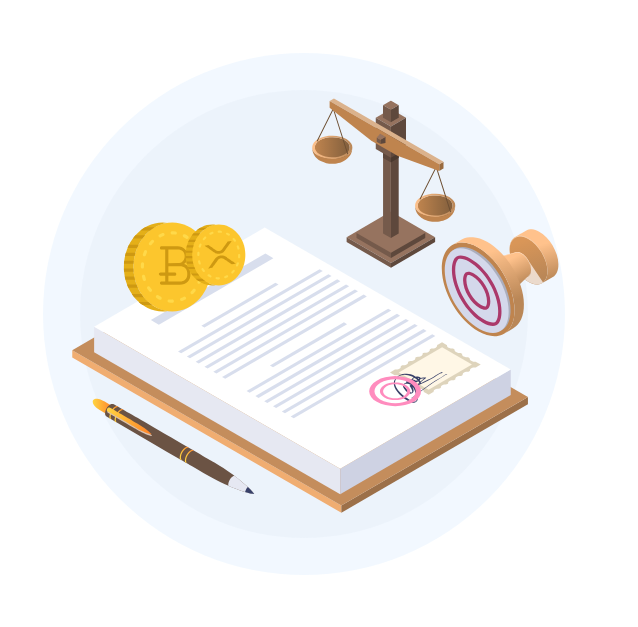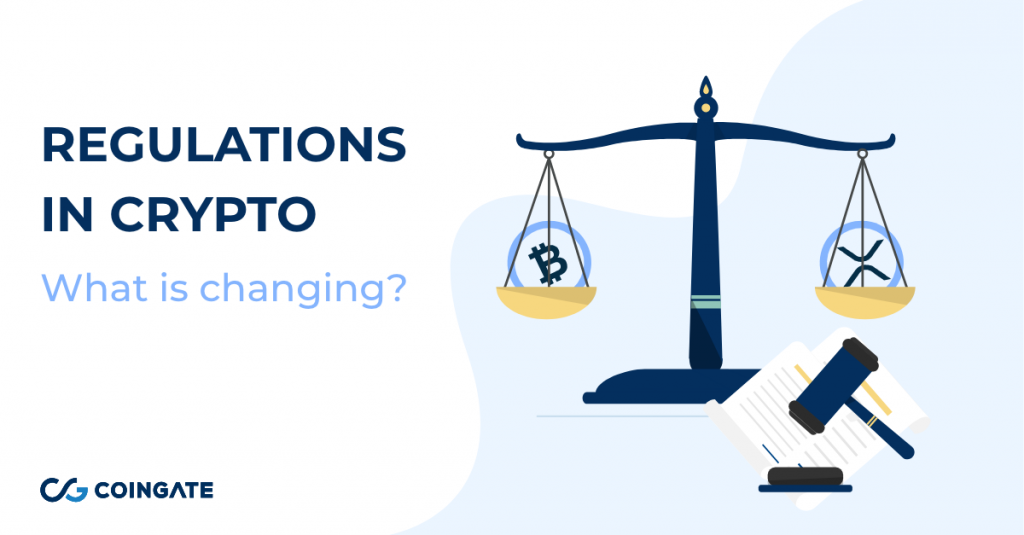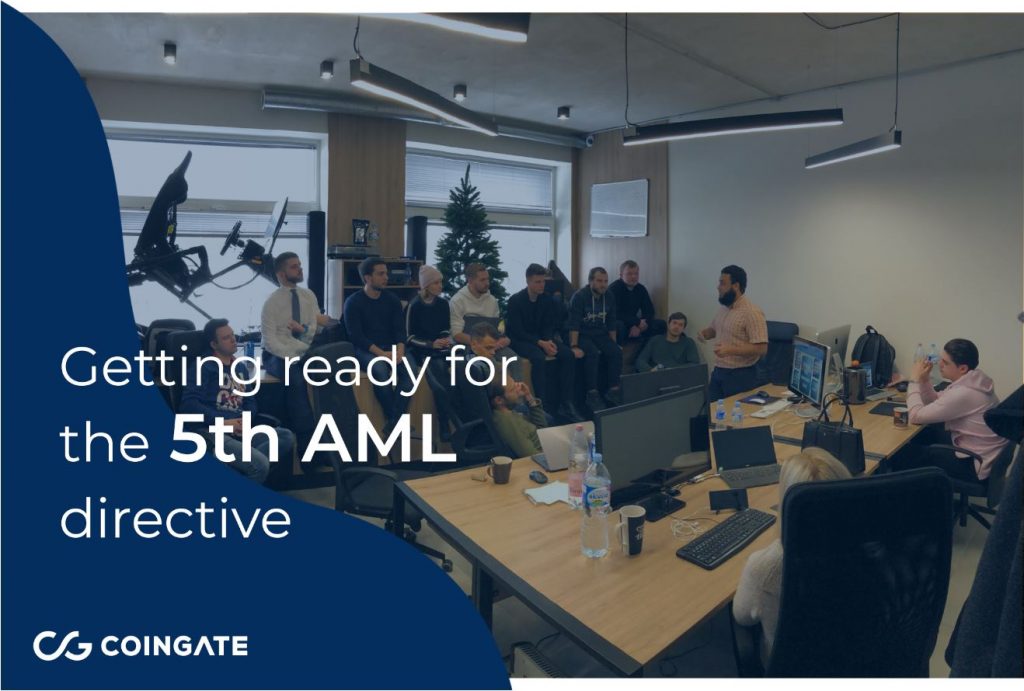
Accept crypto with CoinGate
Accept crypto with confidence using everything you need in one platform.
Crypto Regulation Changes: What in The Pipeline and Why?
Most would deem Bitcoin as charming solely because of a few key reasons: its decentralized nature and inherent privacy. However, not all crypto economy participants have good intentions, meaning that cryptocurrencies may require more discipline to safeguard their legacy.
Until now, governments turned their heads thinking about how digital assets should be treated by law, which leads to some refusing to take virtual currencies seriously. On top of it, there are severe rumors and misconceptions floating around, claiming that crypto space resembles wild, wild west rather than an advanced economy.
However, new regulations for European companies that provide crypto-related services are approaching. New rules aim to exclude bad actors from participating in crypto economies by implementing the necessary tools for identity verification and fund tracing. Even though the rules for financial services are not exactly a new thing, the upcoming 5th AML Directive might set a precedent on how to fight terrorism financing and money laundering that involves digital assets in particular. But more importantly, how to do so without interfering with technological progression and people’s privacy.
Excluding malevolent people
The mathematical algorithm behind the Bitcoin blockchain already governs the most crucial aspects of its economy. It includes how the total supply is changing, what rewards do miners get and how the transactions are signed and processed. Note that no authority does all this and yet, these embedded rules make the blockchain a truly democratic ecosystem that is equally fair to all.
Because of the unique advantages over regular payments, businesses and individuals report to accept crypto more often.. Coinmap data confirms that the number of merchants accepting Bitcoin has surged by more than 700% within the last six years, indicating the rapid growth of interest in digital assets. We, as a payment processor, also can confirm a significant surge in the variety of businesses joining our platform from new regions and unexpected industries.
On top of it, the survey of Kaspersky Lab shows that 13% of people have already used Bitcoin for payments. The study collected responses from over 12,000 consumers in 22 different countries (mainly in Europe and the US).
Still, some appreciate the technology mostly because of the privacy it provides. However, at the same time, it raises concerns whether it is reasonable to perceive all cryptocurrency owners as fair players, especially highlighting the fact that at first glance, it is not clear what belongs to whom on a blockchain and why.
Even though it is a revolutionary technology, it causes issues when mischievous people find ways to abuse such a system. For example, illegal dark web stores are still using digital assets for collecting payments. In some cases, terrorists try to fund their operations using cryptocurrencies, even though they usually fail to do so. Ponzi schemes remain a constant threat as well, luring investors into fraudulent activities. Other unfortunate occurrences like exchange’s attempts to manipulate Bitcoin’s price resulted in SEC’s Bitcoin ETF denials, stating it currently lacks the monitoring tools.
Nonetheless, in all fairness, recent findings testify that cryptocurrency is not useful for most illicit activities. Earlier issued report from the blockchain forensics companies FDD and Ellicit also indicates that less than 1% of all Bitcoin transactions involve money laundering. The 5th AML Directive will prompt businesses to detect and prevent the remaining 1%.
Bitcoin: The myth of anonymity
So why rogue people then usually fail to exploit such privacy-oriented technology as the blockchain? Well, mainly because it is not exactly anonymous. The transactions made on the Bitcoin blockchain are, in fact, transparent and undoubtedly traceable, meaning it is not that easy to hide the money trail on the blockchain anymore. The industry wasn’t dormant throughout the ten years of technology and developed intelligent blockchain forensics tools, such as Chainalysis or Elliptic. These companies can trace the transactions to a particular extent and detect the potential criminal activity.
The ledger’s transparency makes the effort of hiding traces negligible if the transactions catch the attention of authorities. The upcoming directive will simplify the whole process of connecting the right dots by adding more responsibilities for companies to help governments.
So, for digital assets to reach worldwide recognition, the risks have to be minimized, at least at the enterprise level. Thus European businesses that participate in the crypto industry will soon have to be more careful in regards to who is using their services and why. Regulations will prompt the users to disclose their identity to the service provider as a preventive measure against illicit activities, whereas the service providers are obliged to protect this data at all costs.
This evolution can certainly result in changing the conventional image revolving around digital money that was undermining its valuable qualities and making it less attractive for serious consideration.
Can regulations make virtual money more attractive?
 In May 2018, the European Parliament adopted the 5th Anti-Money Laundering (AML) Directive, which will soon redefine how cryptocurrency-related operations and businesses will be perceived, and thus more tensely regulated by the European Union. For most, it might immediately raise a question whether it’s a good thing for the crypto space, or not.
In May 2018, the European Parliament adopted the 5th Anti-Money Laundering (AML) Directive, which will soon redefine how cryptocurrency-related operations and businesses will be perceived, and thus more tensely regulated by the European Union. For most, it might immediately raise a question whether it’s a good thing for the crypto space, or not.
It is up for debate. However, digital assets are becoming more and more popular. The situation urges governments to establish some ground rules for businesses to prevent criminal activities while still enabling people to stay in full control of their funds. It also serves the crypto industry by making digital money more socially responsible, thus more attractive to businesses and individual investors. Still, it is essential to achieve it without intruding into other people’s privacy and damping the technological progress.
Worth noting that all legally operating companies that process cryptocurrencies to and from fiat currency must apply KYC and AML procedures to their customers, which usually done on behalf of the banking partners that follow stringent AML prevention requirements. However, after the 5th AML directive will go into effect, a new set of rules will apply for all companies operating as crypto-custodial wallets or crypto-exchangers/operations, no matter if they are dealing with fiat or not.
How will compliance work in the crypto industry?
First of all, not every participant in the crypto economy will be affected by the upcoming changes. All responsibility to be compliant falls on the companies that provide cryptocurrency-related services in the European region. It means the regular shopper that want to pay to the merchant with digital assets via CoinGate won’t be affected at all.
For traders and merchants to fully avail of such services (e.g., payment gateways, crypto exchanges, brokers, and so on), a service provider has to understand three things: (1) who is this person or company that wants to use the service; (2) where does the money come from (or from which activity); (3) what is the purpose of using the service.
In other words, a customer should identify himself to a service provider to make sure there are no bad intentions involved. However, merchants might have to provide more documentation, mainly if they operate in higher risk countries or deal with large sums of money. Otherwise, both merchant and shoppers can potentially be exploited as a gateway for money laundering operations, terrorism, fraud, and other illicit activities.
Sure, sometimes the verification process might be inconvenient. However, there should be no challenge to provide the documentation as the required documents are pretty standard. Service providers need just enough to justify customer’s activity and cover all the bases, nothing more. If done on time and correctly, the services will never be interrupted.
Will this affect customer’s privacy?
Companies that collect private data of European customers must protect it according to the recent General Data Protection Regulation (GDPR). It means that all companies that deal with European citizens are not legally allowed to exploit sensitive data in any way, and must ensure that it’s used and stored according to the particular security requirements.
Failure to secure such data would result in massive fines that reach up to 20 million euros or 4% of the total worldwide annual turnover. Hence, every business is more than motivated to avoid any data breach as it could end the company in a matter of days. It means that any customer that provides the documents do not risk any more than providing information to a bank, money transfer service or any other financial company.
We at CoinGate also had to tailor new procedures to prepare for the GDPR. We spend the whole year getting ready for its implementation, and that is why today we are absolutely confident with our capabilities to secure customer’s privacy and mitigate all the risks regarding the data protection.
Are there benefits for business and shopper?
Merchants and traders do not lose anything by submitting verification documents. Quite the opposite – it establishes a stronger reputation of a legitimate company. On top of it, it provides access to most popular services like fiat payouts to a bank account. The account verification also allows participating in the global economy without encountering any legal problems with the government.
Even so, using compliant payment processing services might be very beneficial to high-risk industries like gambling. Once the regulations go into effect, crypto payment gateways will be able to help them mitigate a lot of the risks associated with money laundering activities.
To sum up, the whole purpose of regulations is to create an ecosystem where every sender and receiver could be identified in case something feels wrong. Not only it would improve the general environment of Blockchain Fintech but also help identify specific patterns and provide analysis that would otherwise cost a lot for our vendors to develop by themselves. From the first day CoinGate was created, we strived to introduce businesses to crypto economies without any friction. Therefore, we have to take responsibility for leading our merchants through this upcoming compliance journey.
Meanwhile, shoppers that see a trusted payment provider on a merchant’s store can spend their coins with ease of mind, knowing that the merchant is verified and operates a legitimate business. We are happy that CoinGate has already established itself in the industry as a trustworthy payment processor. We will further dedicate our efforts to working only with legitimate and transparent merchants as it is the most appropriate way to grow as a successful company.
CoinGate is getting ready for 5th AML Directive
The 5th AML Directive is right around the corner, and we will witness the first changes on the 1st of September, 2019 until it goes into full effect on the 10th of January, 2020. Thus we will tailor our compliance procedures accordingly to stay ahead of both upcoming regulatory changes and competitors alike. Of course, we will do it in a user-friendly way without any costs for users.
Hopefully, common ground rules will promote trust, legitimacy, and maturity in the crypto ecosystem, also indulge more businesses in getting comfortable with digital money and starting adopting new payment methods. Moreover, these efforts to legitimize digital assets mean nothing less than a prestigious recognition from the governments that could bring more stability to the crypto space.
For companies like ours, however, compliance is not optional. Still, it is also the only way to ensure that we can professionally cater to our customers and crypto communities alike. That is why we will continue building new compliance tools, expand our team and regularly update our customers about the upcoming changes.
Until then, keep an eye for more news from us! If you want to stay on top of things, subscribe to our blog! Just enter your email address down below, and you are good to go!
Accept crypto with CoinGate
Accept crypto with confidence using everything you need in one platform.




